Comprehensive Analysis: Tesco's Global Business Environment
VerifiedAdded on 2023/01/05
|11
|3546
|38
Report
AI Summary
This report offers a comprehensive analysis of Tesco's global business environment. It begins with an introduction to global business and then delves into a SWOT analysis, examining Tesco's strengths, weaknesses, opportunities, and threats. The report then applies PESTLE analysis to assess the political, economic, social, technological, environmental, and legal factors impacting Tesco's operations. Porter's five forces model is used to evaluate the competitive landscape, followed by an examination of Tesco's product life cycle and Porter's value chain analysis. The report concludes with a summary of the key findings and implications for Tesco's strategic decision-making in the global market.
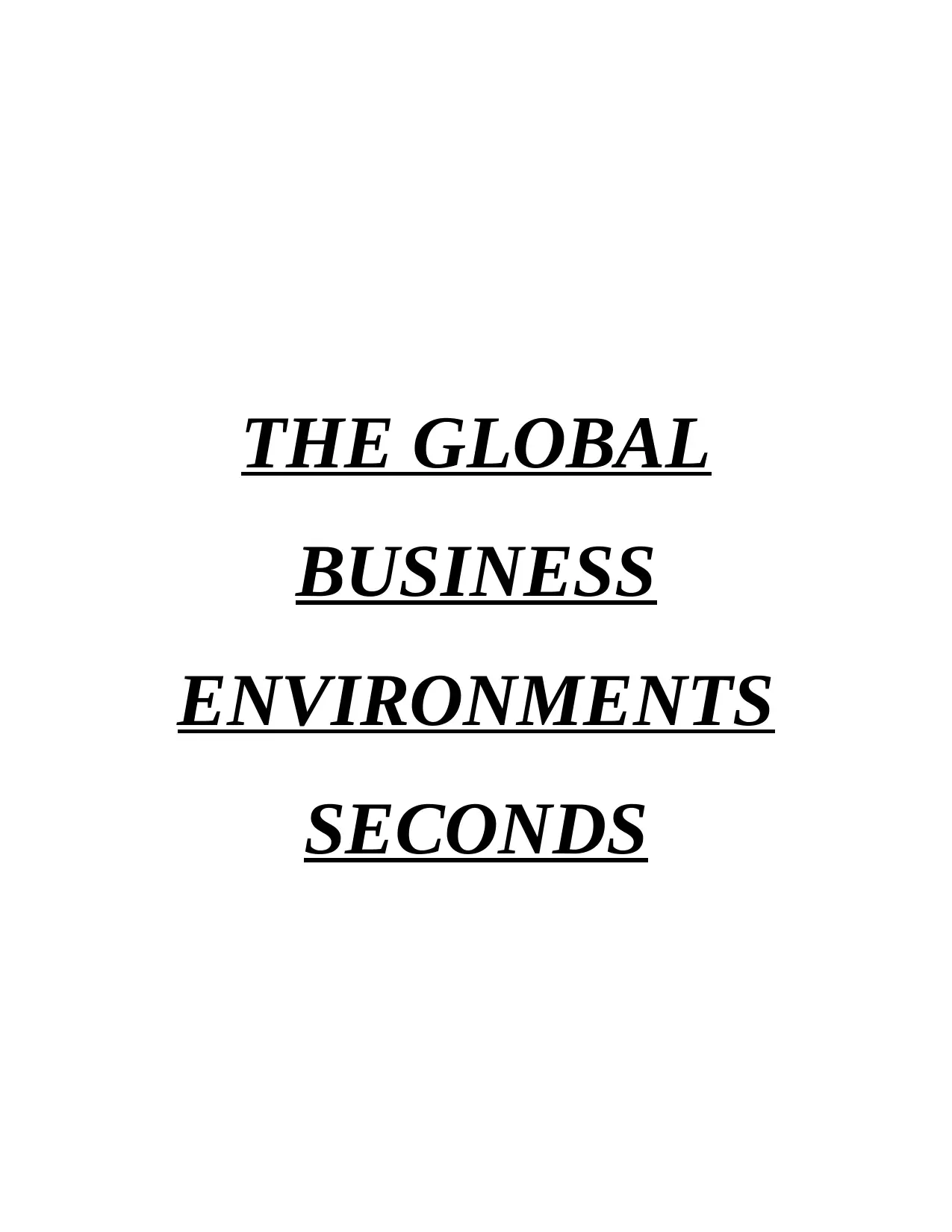
THE GLOBAL
BUSINESS
ENVIRONMENTS
SECONDS
BUSINESS
ENVIRONMENTS
SECONDS
Paraphrase This Document
Need a fresh take? Get an instant paraphrase of this document with our AI Paraphraser
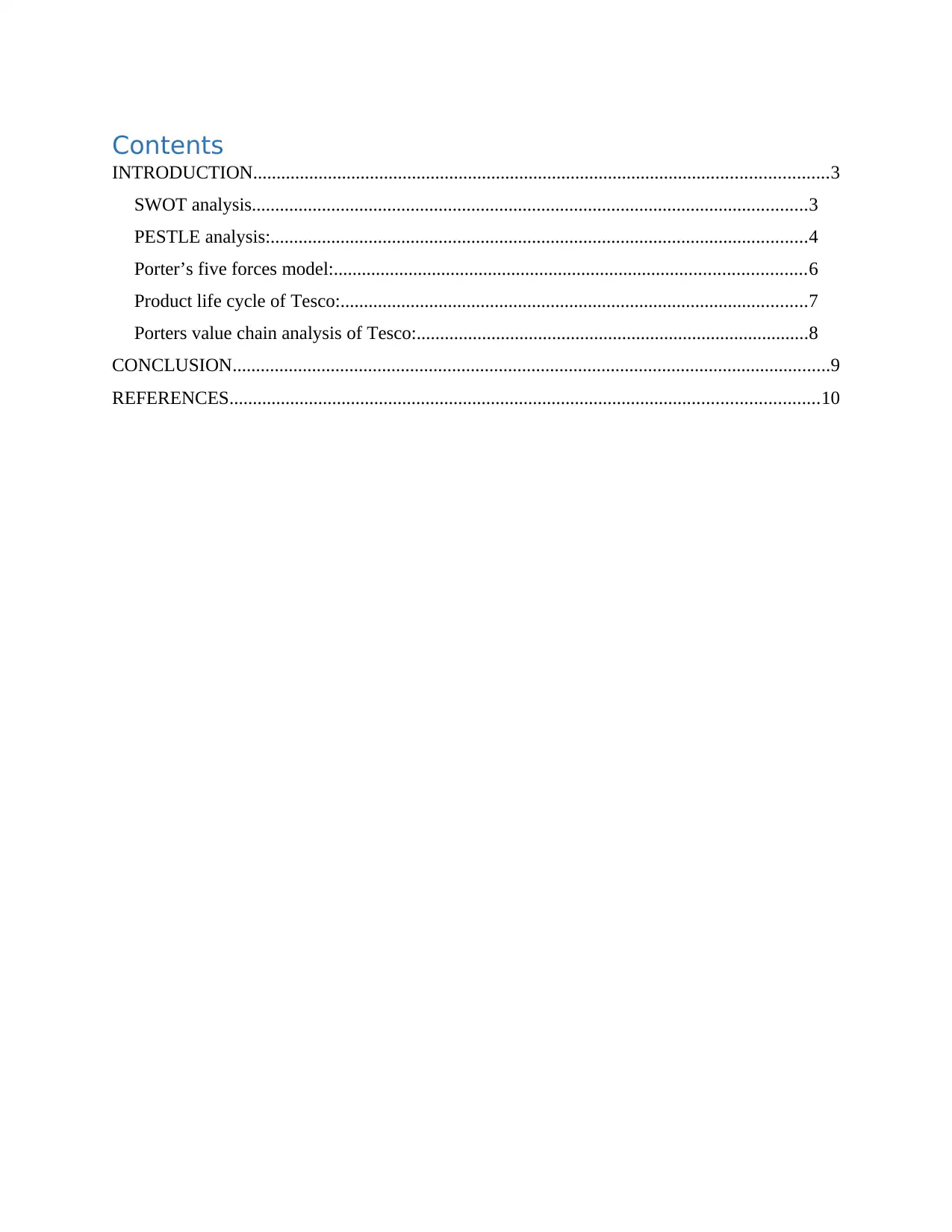
Contents
INTRODUCTION...........................................................................................................................3
SWOT analysis.......................................................................................................................3
PESTLE analysis:...................................................................................................................4
Porter’s five forces model:.....................................................................................................6
Product life cycle of Tesco:....................................................................................................7
Porters value chain analysis of Tesco:....................................................................................8
CONCLUSION................................................................................................................................9
REFERENCES..............................................................................................................................10
INTRODUCTION...........................................................................................................................3
SWOT analysis.......................................................................................................................3
PESTLE analysis:...................................................................................................................4
Porter’s five forces model:.....................................................................................................6
Product life cycle of Tesco:....................................................................................................7
Porters value chain analysis of Tesco:....................................................................................8
CONCLUSION................................................................................................................................9
REFERENCES..............................................................................................................................10
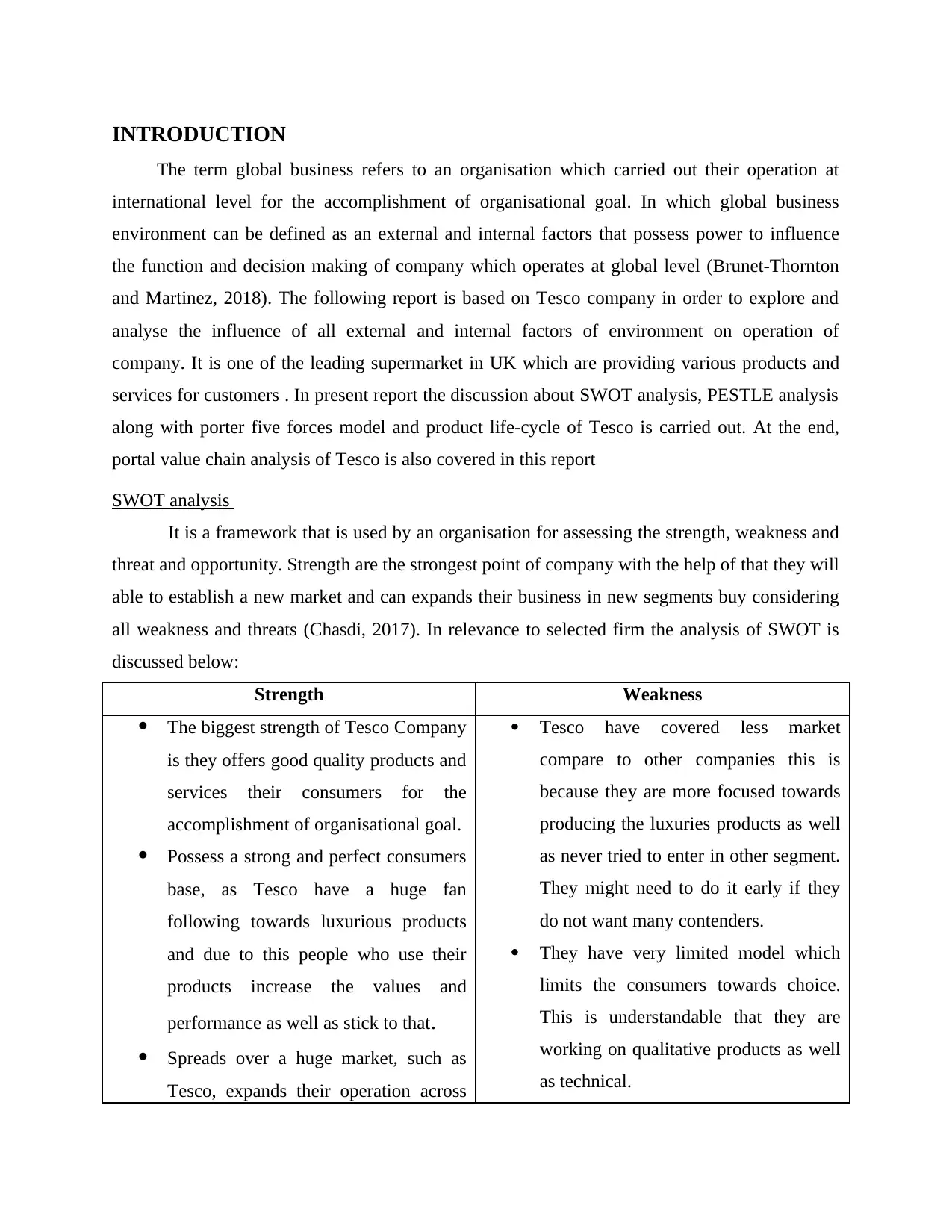
INTRODUCTION
The term global business refers to an organisation which carried out their operation at
international level for the accomplishment of organisational goal. In which global business
environment can be defined as an external and internal factors that possess power to influence
the function and decision making of company which operates at global level (Brunet-Thornton
and Martinez, 2018). The following report is based on Tesco company in order to explore and
analyse the influence of all external and internal factors of environment on operation of
company. It is one of the leading supermarket in UK which are providing various products and
services for customers . In present report the discussion about SWOT analysis, PESTLE analysis
along with porter five forces model and product life-cycle of Tesco is carried out. At the end,
portal value chain analysis of Tesco is also covered in this report
SWOT analysis
It is a framework that is used by an organisation for assessing the strength, weakness and
threat and opportunity. Strength are the strongest point of company with the help of that they will
able to establish a new market and can expands their business in new segments buy considering
all weakness and threats (Chasdi, 2017). In relevance to selected firm the analysis of SWOT is
discussed below:
Strength Weakness
The biggest strength of Tesco Company
is they offers good quality products and
services their consumers for the
accomplishment of organisational goal.
Possess a strong and perfect consumers
base, as Tesco have a huge fan
following towards luxurious products
and due to this people who use their
products increase the values and
performance as well as stick to that.
Spreads over a huge market, such as
Tesco, expands their operation across
Tesco have covered less market
compare to other companies this is
because they are more focused towards
producing the luxuries products as well
as never tried to enter in other segment.
They might need to do it early if they
do not want many contenders.
They have very limited model which
limits the consumers towards choice.
This is understandable that they are
working on qualitative products as well
as technical.
The term global business refers to an organisation which carried out their operation at
international level for the accomplishment of organisational goal. In which global business
environment can be defined as an external and internal factors that possess power to influence
the function and decision making of company which operates at global level (Brunet-Thornton
and Martinez, 2018). The following report is based on Tesco company in order to explore and
analyse the influence of all external and internal factors of environment on operation of
company. It is one of the leading supermarket in UK which are providing various products and
services for customers . In present report the discussion about SWOT analysis, PESTLE analysis
along with porter five forces model and product life-cycle of Tesco is carried out. At the end,
portal value chain analysis of Tesco is also covered in this report
SWOT analysis
It is a framework that is used by an organisation for assessing the strength, weakness and
threat and opportunity. Strength are the strongest point of company with the help of that they will
able to establish a new market and can expands their business in new segments buy considering
all weakness and threats (Chasdi, 2017). In relevance to selected firm the analysis of SWOT is
discussed below:
Strength Weakness
The biggest strength of Tesco Company
is they offers good quality products and
services their consumers for the
accomplishment of organisational goal.
Possess a strong and perfect consumers
base, as Tesco have a huge fan
following towards luxurious products
and due to this people who use their
products increase the values and
performance as well as stick to that.
Spreads over a huge market, such as
Tesco, expands their operation across
Tesco have covered less market
compare to other companies this is
because they are more focused towards
producing the luxuries products as well
as never tried to enter in other segment.
They might need to do it early if they
do not want many contenders.
They have very limited model which
limits the consumers towards choice.
This is understandable that they are
working on qualitative products as well
as technical.
⊘ This is a preview!⊘
Do you want full access?
Subscribe today to unlock all pages.

Trusted by 1+ million students worldwide
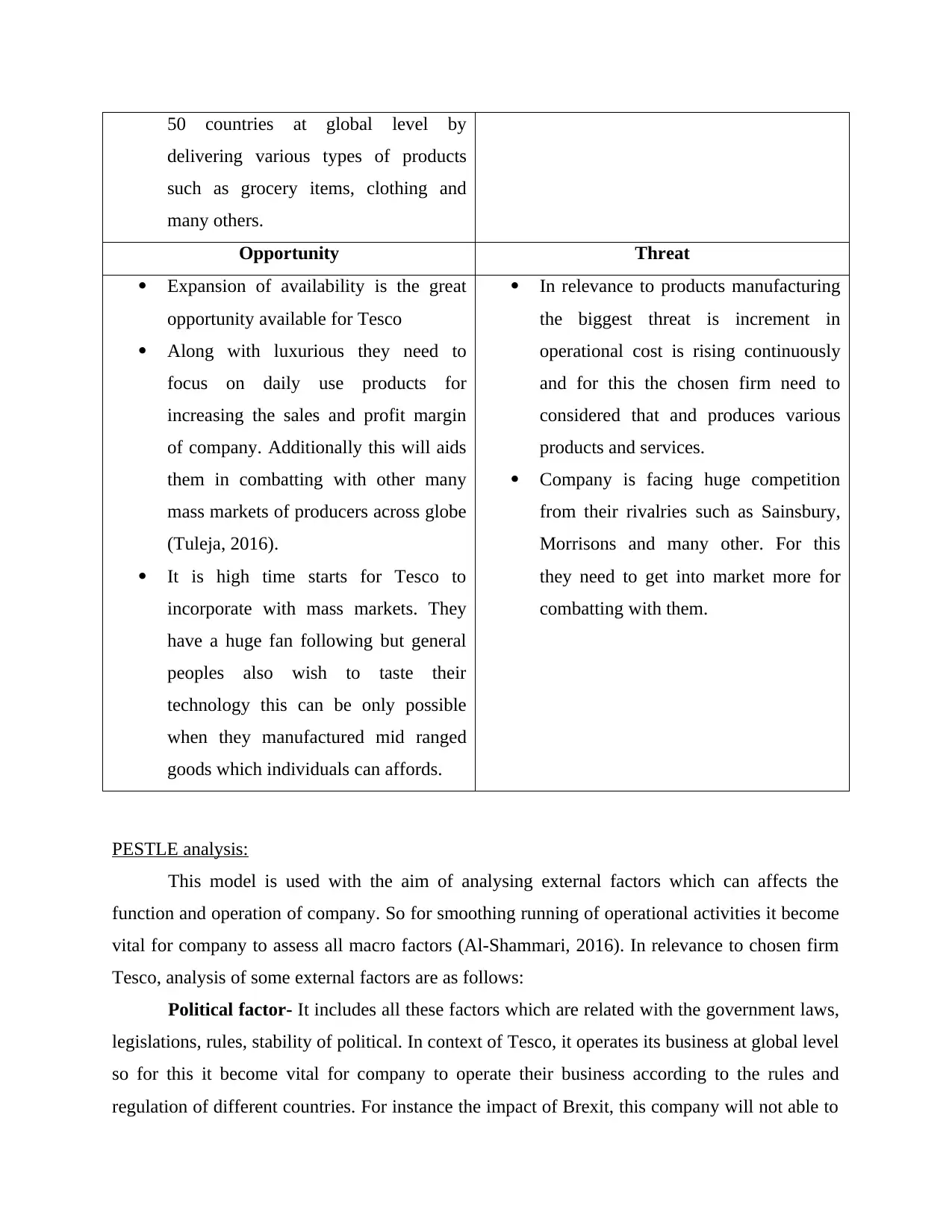
50 countries at global level by
delivering various types of products
such as grocery items, clothing and
many others.
Opportunity Threat
Expansion of availability is the great
opportunity available for Tesco
Along with luxurious they need to
focus on daily use products for
increasing the sales and profit margin
of company. Additionally this will aids
them in combatting with other many
mass markets of producers across globe
(Tuleja, 2016).
It is high time starts for Tesco to
incorporate with mass markets. They
have a huge fan following but general
peoples also wish to taste their
technology this can be only possible
when they manufactured mid ranged
goods which individuals can affords.
In relevance to products manufacturing
the biggest threat is increment in
operational cost is rising continuously
and for this the chosen firm need to
considered that and produces various
products and services.
Company is facing huge competition
from their rivalries such as Sainsbury,
Morrisons and many other. For this
they need to get into market more for
combatting with them.
PESTLE analysis:
This model is used with the aim of analysing external factors which can affects the
function and operation of company. So for smoothing running of operational activities it become
vital for company to assess all macro factors (Al-Shammari, 2016). In relevance to chosen firm
Tesco, analysis of some external factors are as follows:
Political factor- It includes all these factors which are related with the government laws,
legislations, rules, stability of political. In context of Tesco, it operates its business at global level
so for this it become vital for company to operate their business according to the rules and
regulation of different countries. For instance the impact of Brexit, this company will not able to
delivering various types of products
such as grocery items, clothing and
many others.
Opportunity Threat
Expansion of availability is the great
opportunity available for Tesco
Along with luxurious they need to
focus on daily use products for
increasing the sales and profit margin
of company. Additionally this will aids
them in combatting with other many
mass markets of producers across globe
(Tuleja, 2016).
It is high time starts for Tesco to
incorporate with mass markets. They
have a huge fan following but general
peoples also wish to taste their
technology this can be only possible
when they manufactured mid ranged
goods which individuals can affords.
In relevance to products manufacturing
the biggest threat is increment in
operational cost is rising continuously
and for this the chosen firm need to
considered that and produces various
products and services.
Company is facing huge competition
from their rivalries such as Sainsbury,
Morrisons and many other. For this
they need to get into market more for
combatting with them.
PESTLE analysis:
This model is used with the aim of analysing external factors which can affects the
function and operation of company. So for smoothing running of operational activities it become
vital for company to assess all macro factors (Al-Shammari, 2016). In relevance to chosen firm
Tesco, analysis of some external factors are as follows:
Political factor- It includes all these factors which are related with the government laws,
legislations, rules, stability of political. In context of Tesco, it operates its business at global level
so for this it become vital for company to operate their business according to the rules and
regulation of different countries. For instance the impact of Brexit, this company will not able to
Paraphrase This Document
Need a fresh take? Get an instant paraphrase of this document with our AI Paraphraser
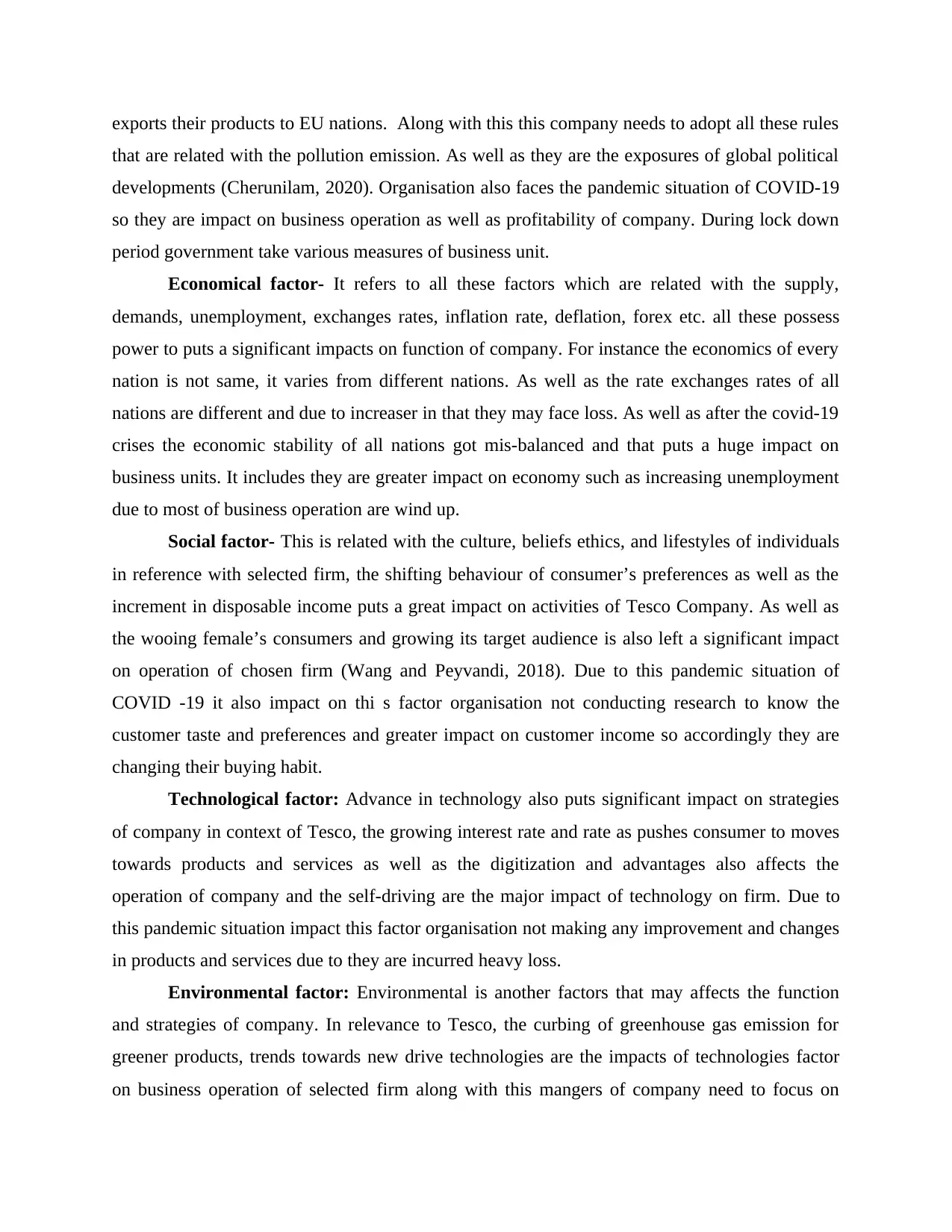
exports their products to EU nations. Along with this this company needs to adopt all these rules
that are related with the pollution emission. As well as they are the exposures of global political
developments (Cherunilam, 2020). Organisation also faces the pandemic situation of COVID-19
so they are impact on business operation as well as profitability of company. During lock down
period government take various measures of business unit.
Economical factor- It refers to all these factors which are related with the supply,
demands, unemployment, exchanges rates, inflation rate, deflation, forex etc. all these possess
power to puts a significant impacts on function of company. For instance the economics of every
nation is not same, it varies from different nations. As well as the rate exchanges rates of all
nations are different and due to increaser in that they may face loss. As well as after the covid-19
crises the economic stability of all nations got mis-balanced and that puts a huge impact on
business units. It includes they are greater impact on economy such as increasing unemployment
due to most of business operation are wind up.
Social factor- This is related with the culture, beliefs ethics, and lifestyles of individuals
in reference with selected firm, the shifting behaviour of consumer’s preferences as well as the
increment in disposable income puts a great impact on activities of Tesco Company. As well as
the wooing female’s consumers and growing its target audience is also left a significant impact
on operation of chosen firm (Wang and Peyvandi, 2018). Due to this pandemic situation of
COVID -19 it also impact on thi s factor organisation not conducting research to know the
customer taste and preferences and greater impact on customer income so accordingly they are
changing their buying habit.
Technological factor: Advance in technology also puts significant impact on strategies
of company in context of Tesco, the growing interest rate and rate as pushes consumer to moves
towards products and services as well as the digitization and advantages also affects the
operation of company and the self-driving are the major impact of technology on firm. Due to
this pandemic situation impact this factor organisation not making any improvement and changes
in products and services due to they are incurred heavy loss.
Environmental factor: Environmental is another factors that may affects the function
and strategies of company. In relevance to Tesco, the curbing of greenhouse gas emission for
greener products, trends towards new drive technologies are the impacts of technologies factor
on business operation of selected firm along with this mangers of company need to focus on
that are related with the pollution emission. As well as they are the exposures of global political
developments (Cherunilam, 2020). Organisation also faces the pandemic situation of COVID-19
so they are impact on business operation as well as profitability of company. During lock down
period government take various measures of business unit.
Economical factor- It refers to all these factors which are related with the supply,
demands, unemployment, exchanges rates, inflation rate, deflation, forex etc. all these possess
power to puts a significant impacts on function of company. For instance the economics of every
nation is not same, it varies from different nations. As well as the rate exchanges rates of all
nations are different and due to increaser in that they may face loss. As well as after the covid-19
crises the economic stability of all nations got mis-balanced and that puts a huge impact on
business units. It includes they are greater impact on economy such as increasing unemployment
due to most of business operation are wind up.
Social factor- This is related with the culture, beliefs ethics, and lifestyles of individuals
in reference with selected firm, the shifting behaviour of consumer’s preferences as well as the
increment in disposable income puts a great impact on activities of Tesco Company. As well as
the wooing female’s consumers and growing its target audience is also left a significant impact
on operation of chosen firm (Wang and Peyvandi, 2018). Due to this pandemic situation of
COVID -19 it also impact on thi s factor organisation not conducting research to know the
customer taste and preferences and greater impact on customer income so accordingly they are
changing their buying habit.
Technological factor: Advance in technology also puts significant impact on strategies
of company in context of Tesco, the growing interest rate and rate as pushes consumer to moves
towards products and services as well as the digitization and advantages also affects the
operation of company and the self-driving are the major impact of technology on firm. Due to
this pandemic situation impact this factor organisation not making any improvement and changes
in products and services due to they are incurred heavy loss.
Environmental factor: Environmental is another factors that may affects the function
and strategies of company. In relevance to Tesco, the curbing of greenhouse gas emission for
greener products, trends towards new drive technologies are the impacts of technologies factor
on business operation of selected firm along with this mangers of company need to focus on
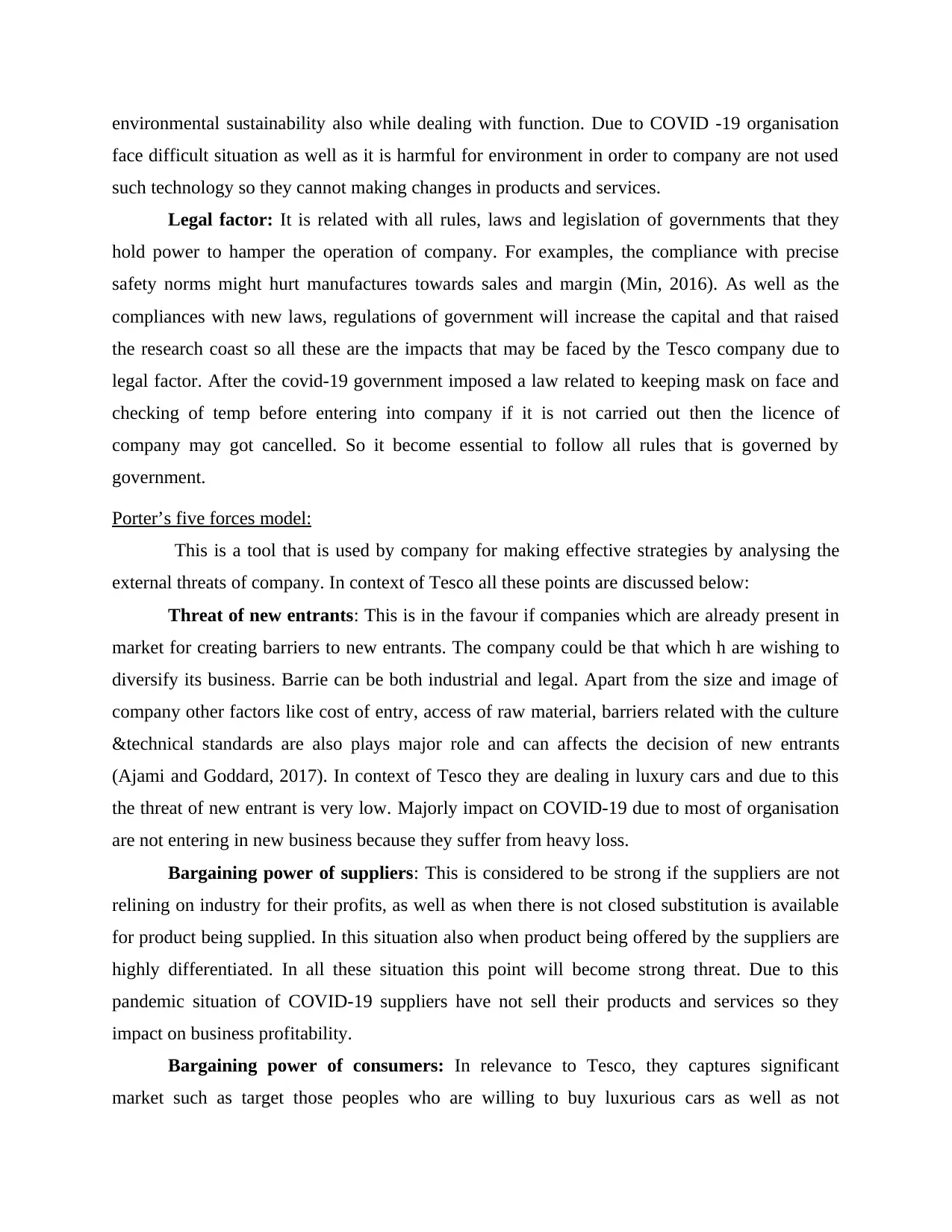
environmental sustainability also while dealing with function. Due to COVID -19 organisation
face difficult situation as well as it is harmful for environment in order to company are not used
such technology so they cannot making changes in products and services.
Legal factor: It is related with all rules, laws and legislation of governments that they
hold power to hamper the operation of company. For examples, the compliance with precise
safety norms might hurt manufactures towards sales and margin (Min, 2016). As well as the
compliances with new laws, regulations of government will increase the capital and that raised
the research coast so all these are the impacts that may be faced by the Tesco company due to
legal factor. After the covid-19 government imposed a law related to keeping mask on face and
checking of temp before entering into company if it is not carried out then the licence of
company may got cancelled. So it become essential to follow all rules that is governed by
government.
Porter’s five forces model:
This is a tool that is used by company for making effective strategies by analysing the
external threats of company. In context of Tesco all these points are discussed below:
Threat of new entrants: This is in the favour if companies which are already present in
market for creating barriers to new entrants. The company could be that which h are wishing to
diversify its business. Barrie can be both industrial and legal. Apart from the size and image of
company other factors like cost of entry, access of raw material, barriers related with the culture
&technical standards are also plays major role and can affects the decision of new entrants
(Ajami and Goddard, 2017). In context of Tesco they are dealing in luxury cars and due to this
the threat of new entrant is very low. Majorly impact on COVID-19 due to most of organisation
are not entering in new business because they suffer from heavy loss.
Bargaining power of suppliers: This is considered to be strong if the suppliers are not
relining on industry for their profits, as well as when there is not closed substitution is available
for product being supplied. In this situation also when product being offered by the suppliers are
highly differentiated. In all these situation this point will become strong threat. Due to this
pandemic situation of COVID-19 suppliers have not sell their products and services so they
impact on business profitability.
Bargaining power of consumers: In relevance to Tesco, they captures significant
market such as target those peoples who are willing to buy luxurious cars as well as not
face difficult situation as well as it is harmful for environment in order to company are not used
such technology so they cannot making changes in products and services.
Legal factor: It is related with all rules, laws and legislation of governments that they
hold power to hamper the operation of company. For examples, the compliance with precise
safety norms might hurt manufactures towards sales and margin (Min, 2016). As well as the
compliances with new laws, regulations of government will increase the capital and that raised
the research coast so all these are the impacts that may be faced by the Tesco company due to
legal factor. After the covid-19 government imposed a law related to keeping mask on face and
checking of temp before entering into company if it is not carried out then the licence of
company may got cancelled. So it become essential to follow all rules that is governed by
government.
Porter’s five forces model:
This is a tool that is used by company for making effective strategies by analysing the
external threats of company. In context of Tesco all these points are discussed below:
Threat of new entrants: This is in the favour if companies which are already present in
market for creating barriers to new entrants. The company could be that which h are wishing to
diversify its business. Barrie can be both industrial and legal. Apart from the size and image of
company other factors like cost of entry, access of raw material, barriers related with the culture
&technical standards are also plays major role and can affects the decision of new entrants
(Ajami and Goddard, 2017). In context of Tesco they are dealing in luxury cars and due to this
the threat of new entrant is very low. Majorly impact on COVID-19 due to most of organisation
are not entering in new business because they suffer from heavy loss.
Bargaining power of suppliers: This is considered to be strong if the suppliers are not
relining on industry for their profits, as well as when there is not closed substitution is available
for product being supplied. In this situation also when product being offered by the suppliers are
highly differentiated. In all these situation this point will become strong threat. Due to this
pandemic situation of COVID-19 suppliers have not sell their products and services so they
impact on business profitability.
Bargaining power of consumers: In relevance to Tesco, they captures significant
market such as target those peoples who are willing to buy luxurious cars as well as not
⊘ This is a preview!⊘
Do you want full access?
Subscribe today to unlock all pages.

Trusted by 1+ million students worldwide
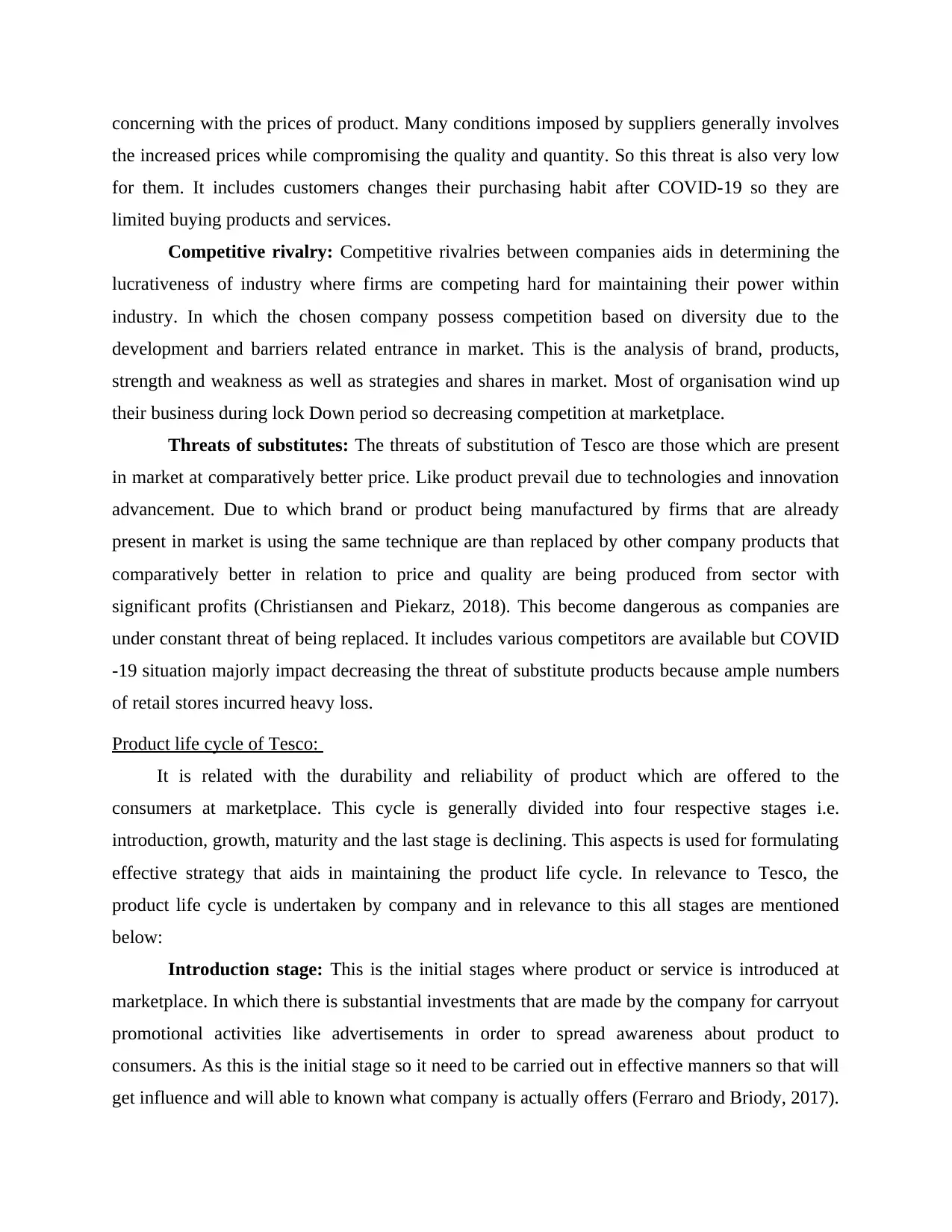
concerning with the prices of product. Many conditions imposed by suppliers generally involves
the increased prices while compromising the quality and quantity. So this threat is also very low
for them. It includes customers changes their purchasing habit after COVID-19 so they are
limited buying products and services.
Competitive rivalry: Competitive rivalries between companies aids in determining the
lucrativeness of industry where firms are competing hard for maintaining their power within
industry. In which the chosen company possess competition based on diversity due to the
development and barriers related entrance in market. This is the analysis of brand, products,
strength and weakness as well as strategies and shares in market. Most of organisation wind up
their business during lock Down period so decreasing competition at marketplace.
Threats of substitutes: The threats of substitution of Tesco are those which are present
in market at comparatively better price. Like product prevail due to technologies and innovation
advancement. Due to which brand or product being manufactured by firms that are already
present in market is using the same technique are than replaced by other company products that
comparatively better in relation to price and quality are being produced from sector with
significant profits (Christiansen and Piekarz, 2018). This become dangerous as companies are
under constant threat of being replaced. It includes various competitors are available but COVID
-19 situation majorly impact decreasing the threat of substitute products because ample numbers
of retail stores incurred heavy loss.
Product life cycle of Tesco:
It is related with the durability and reliability of product which are offered to the
consumers at marketplace. This cycle is generally divided into four respective stages i.e.
introduction, growth, maturity and the last stage is declining. This aspects is used for formulating
effective strategy that aids in maintaining the product life cycle. In relevance to Tesco, the
product life cycle is undertaken by company and in relevance to this all stages are mentioned
below:
Introduction stage: This is the initial stages where product or service is introduced at
marketplace. In which there is substantial investments that are made by the company for carryout
promotional activities like advertisements in order to spread awareness about product to
consumers. As this is the initial stage so it need to be carried out in effective manners so that will
get influence and will able to known what company is actually offers (Ferraro and Briody, 2017).
the increased prices while compromising the quality and quantity. So this threat is also very low
for them. It includes customers changes their purchasing habit after COVID-19 so they are
limited buying products and services.
Competitive rivalry: Competitive rivalries between companies aids in determining the
lucrativeness of industry where firms are competing hard for maintaining their power within
industry. In which the chosen company possess competition based on diversity due to the
development and barriers related entrance in market. This is the analysis of brand, products,
strength and weakness as well as strategies and shares in market. Most of organisation wind up
their business during lock Down period so decreasing competition at marketplace.
Threats of substitutes: The threats of substitution of Tesco are those which are present
in market at comparatively better price. Like product prevail due to technologies and innovation
advancement. Due to which brand or product being manufactured by firms that are already
present in market is using the same technique are than replaced by other company products that
comparatively better in relation to price and quality are being produced from sector with
significant profits (Christiansen and Piekarz, 2018). This become dangerous as companies are
under constant threat of being replaced. It includes various competitors are available but COVID
-19 situation majorly impact decreasing the threat of substitute products because ample numbers
of retail stores incurred heavy loss.
Product life cycle of Tesco:
It is related with the durability and reliability of product which are offered to the
consumers at marketplace. This cycle is generally divided into four respective stages i.e.
introduction, growth, maturity and the last stage is declining. This aspects is used for formulating
effective strategy that aids in maintaining the product life cycle. In relevance to Tesco, the
product life cycle is undertaken by company and in relevance to this all stages are mentioned
below:
Introduction stage: This is the initial stages where product or service is introduced at
marketplace. In which there is substantial investments that are made by the company for carryout
promotional activities like advertisements in order to spread awareness about product to
consumers. As this is the initial stage so it need to be carried out in effective manners so that will
get influence and will able to known what company is actually offers (Ferraro and Briody, 2017).
Paraphrase This Document
Need a fresh take? Get an instant paraphrase of this document with our AI Paraphraser
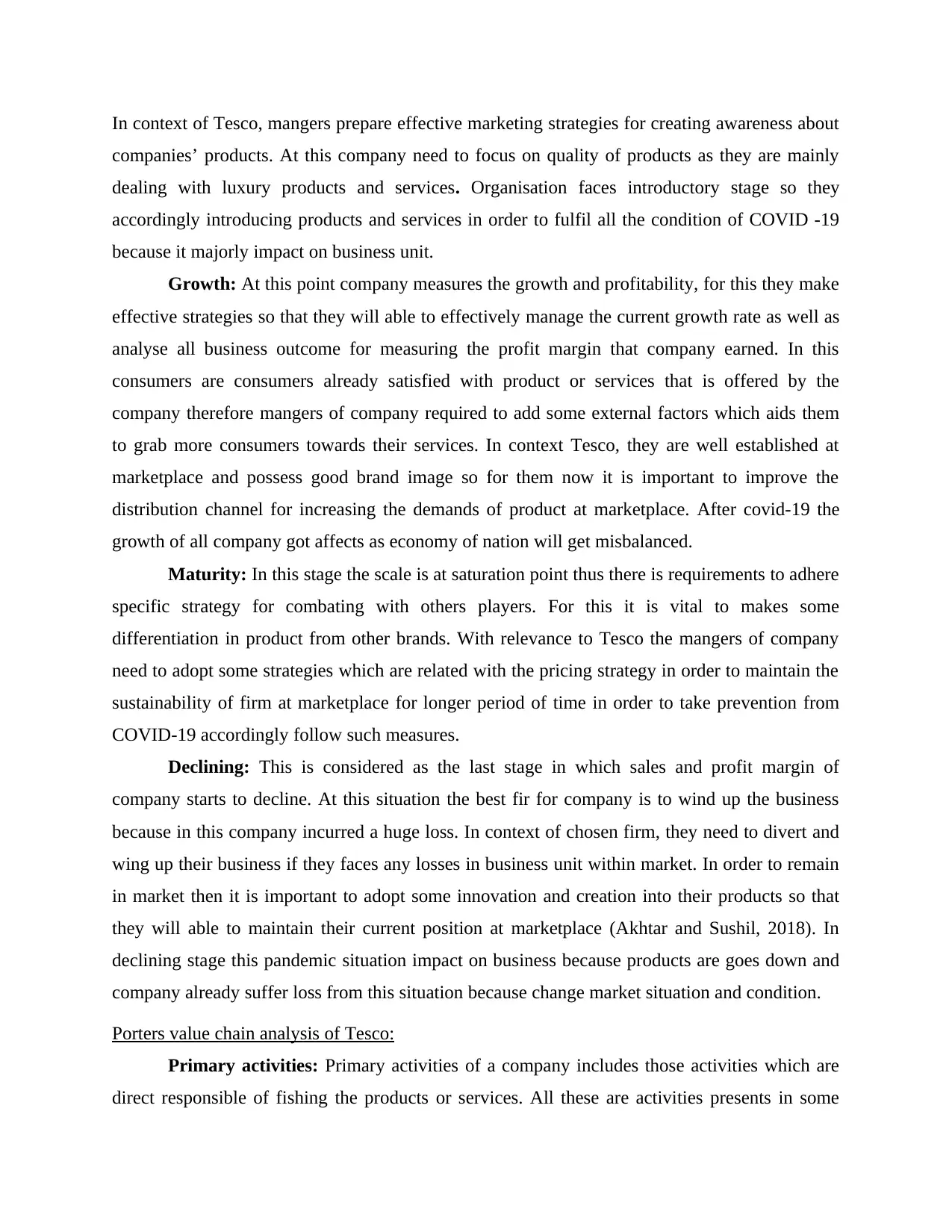
In context of Tesco, mangers prepare effective marketing strategies for creating awareness about
companies’ products. At this company need to focus on quality of products as they are mainly
dealing with luxury products and services. Organisation faces introductory stage so they
accordingly introducing products and services in order to fulfil all the condition of COVID -19
because it majorly impact on business unit.
Growth: At this point company measures the growth and profitability, for this they make
effective strategies so that they will able to effectively manage the current growth rate as well as
analyse all business outcome for measuring the profit margin that company earned. In this
consumers are consumers already satisfied with product or services that is offered by the
company therefore mangers of company required to add some external factors which aids them
to grab more consumers towards their services. In context Tesco, they are well established at
marketplace and possess good brand image so for them now it is important to improve the
distribution channel for increasing the demands of product at marketplace. After covid-19 the
growth of all company got affects as economy of nation will get misbalanced.
Maturity: In this stage the scale is at saturation point thus there is requirements to adhere
specific strategy for combating with others players. For this it is vital to makes some
differentiation in product from other brands. With relevance to Tesco the mangers of company
need to adopt some strategies which are related with the pricing strategy in order to maintain the
sustainability of firm at marketplace for longer period of time in order to take prevention from
COVID-19 accordingly follow such measures.
Declining: This is considered as the last stage in which sales and profit margin of
company starts to decline. At this situation the best fir for company is to wind up the business
because in this company incurred a huge loss. In context of chosen firm, they need to divert and
wing up their business if they faces any losses in business unit within market. In order to remain
in market then it is important to adopt some innovation and creation into their products so that
they will able to maintain their current position at marketplace (Akhtar and Sushil, 2018). In
declining stage this pandemic situation impact on business because products are goes down and
company already suffer loss from this situation because change market situation and condition.
Porters value chain analysis of Tesco:
Primary activities: Primary activities of a company includes those activities which are
direct responsible of fishing the products or services. All these are activities presents in some
companies’ products. At this company need to focus on quality of products as they are mainly
dealing with luxury products and services. Organisation faces introductory stage so they
accordingly introducing products and services in order to fulfil all the condition of COVID -19
because it majorly impact on business unit.
Growth: At this point company measures the growth and profitability, for this they make
effective strategies so that they will able to effectively manage the current growth rate as well as
analyse all business outcome for measuring the profit margin that company earned. In this
consumers are consumers already satisfied with product or services that is offered by the
company therefore mangers of company required to add some external factors which aids them
to grab more consumers towards their services. In context Tesco, they are well established at
marketplace and possess good brand image so for them now it is important to improve the
distribution channel for increasing the demands of product at marketplace. After covid-19 the
growth of all company got affects as economy of nation will get misbalanced.
Maturity: In this stage the scale is at saturation point thus there is requirements to adhere
specific strategy for combating with others players. For this it is vital to makes some
differentiation in product from other brands. With relevance to Tesco the mangers of company
need to adopt some strategies which are related with the pricing strategy in order to maintain the
sustainability of firm at marketplace for longer period of time in order to take prevention from
COVID-19 accordingly follow such measures.
Declining: This is considered as the last stage in which sales and profit margin of
company starts to decline. At this situation the best fir for company is to wind up the business
because in this company incurred a huge loss. In context of chosen firm, they need to divert and
wing up their business if they faces any losses in business unit within market. In order to remain
in market then it is important to adopt some innovation and creation into their products so that
they will able to maintain their current position at marketplace (Akhtar and Sushil, 2018). In
declining stage this pandemic situation impact on business because products are goes down and
company already suffer loss from this situation because change market situation and condition.
Porters value chain analysis of Tesco:
Primary activities: Primary activities of a company includes those activities which are
direct responsible of fishing the products or services. All these are activities presents in some
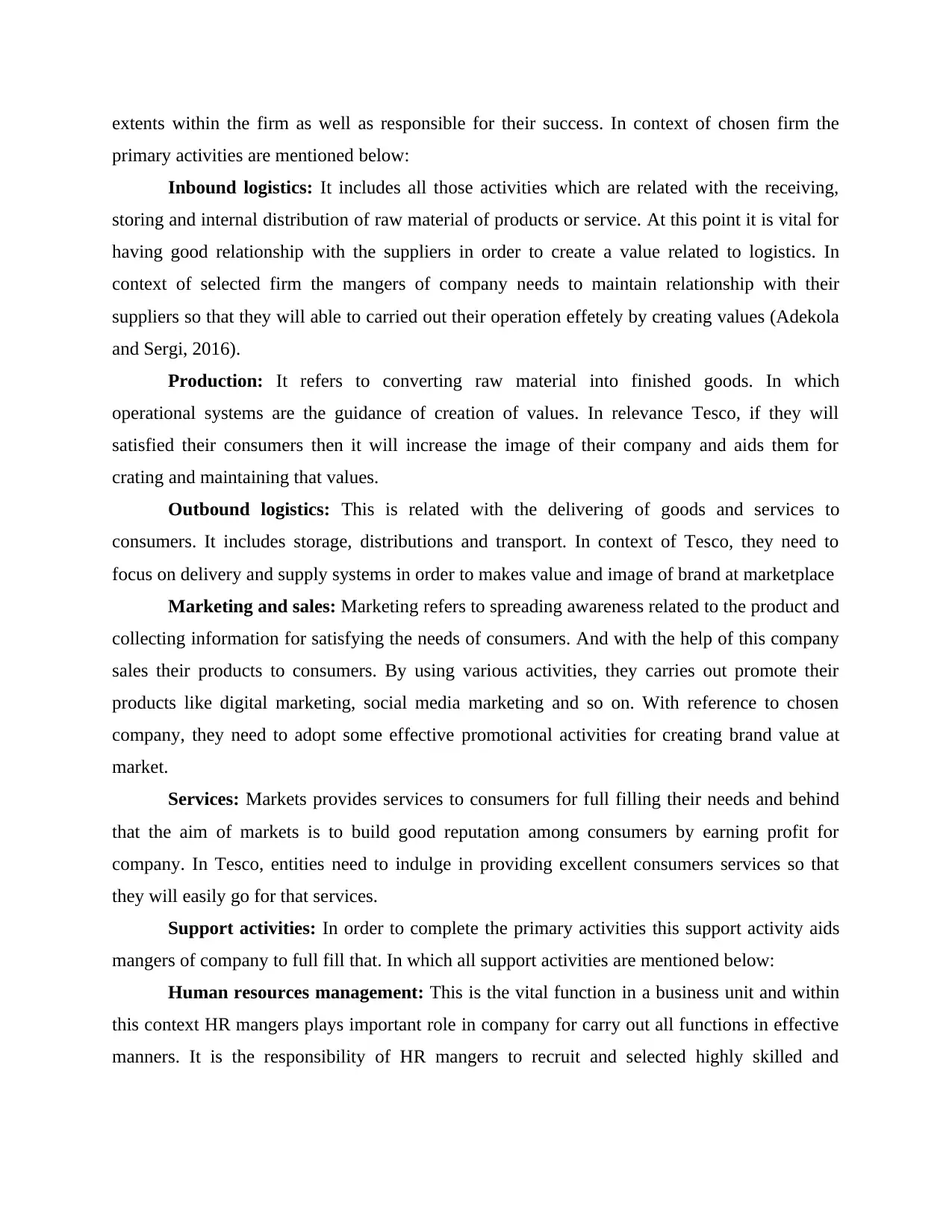
extents within the firm as well as responsible for their success. In context of chosen firm the
primary activities are mentioned below:
Inbound logistics: It includes all those activities which are related with the receiving,
storing and internal distribution of raw material of products or service. At this point it is vital for
having good relationship with the suppliers in order to create a value related to logistics. In
context of selected firm the mangers of company needs to maintain relationship with their
suppliers so that they will able to carried out their operation effetely by creating values (Adekola
and Sergi, 2016).
Production: It refers to converting raw material into finished goods. In which
operational systems are the guidance of creation of values. In relevance Tesco, if they will
satisfied their consumers then it will increase the image of their company and aids them for
crating and maintaining that values.
Outbound logistics: This is related with the delivering of goods and services to
consumers. It includes storage, distributions and transport. In context of Tesco, they need to
focus on delivery and supply systems in order to makes value and image of brand at marketplace
Marketing and sales: Marketing refers to spreading awareness related to the product and
collecting information for satisfying the needs of consumers. And with the help of this company
sales their products to consumers. By using various activities, they carries out promote their
products like digital marketing, social media marketing and so on. With reference to chosen
company, they need to adopt some effective promotional activities for creating brand value at
market.
Services: Markets provides services to consumers for full filling their needs and behind
that the aim of markets is to build good reputation among consumers by earning profit for
company. In Tesco, entities need to indulge in providing excellent consumers services so that
they will easily go for that services.
Support activities: In order to complete the primary activities this support activity aids
mangers of company to full fill that. In which all support activities are mentioned below:
Human resources management: This is the vital function in a business unit and within
this context HR mangers plays important role in company for carry out all functions in effective
manners. It is the responsibility of HR mangers to recruit and selected highly skilled and
primary activities are mentioned below:
Inbound logistics: It includes all those activities which are related with the receiving,
storing and internal distribution of raw material of products or service. At this point it is vital for
having good relationship with the suppliers in order to create a value related to logistics. In
context of selected firm the mangers of company needs to maintain relationship with their
suppliers so that they will able to carried out their operation effetely by creating values (Adekola
and Sergi, 2016).
Production: It refers to converting raw material into finished goods. In which
operational systems are the guidance of creation of values. In relevance Tesco, if they will
satisfied their consumers then it will increase the image of their company and aids them for
crating and maintaining that values.
Outbound logistics: This is related with the delivering of goods and services to
consumers. It includes storage, distributions and transport. In context of Tesco, they need to
focus on delivery and supply systems in order to makes value and image of brand at marketplace
Marketing and sales: Marketing refers to spreading awareness related to the product and
collecting information for satisfying the needs of consumers. And with the help of this company
sales their products to consumers. By using various activities, they carries out promote their
products like digital marketing, social media marketing and so on. With reference to chosen
company, they need to adopt some effective promotional activities for creating brand value at
market.
Services: Markets provides services to consumers for full filling their needs and behind
that the aim of markets is to build good reputation among consumers by earning profit for
company. In Tesco, entities need to indulge in providing excellent consumers services so that
they will easily go for that services.
Support activities: In order to complete the primary activities this support activity aids
mangers of company to full fill that. In which all support activities are mentioned below:
Human resources management: This is the vital function in a business unit and within
this context HR mangers plays important role in company for carry out all functions in effective
manners. It is the responsibility of HR mangers to recruit and selected highly skilled and
⊘ This is a preview!⊘
Do you want full access?
Subscribe today to unlock all pages.

Trusted by 1+ million students worldwide
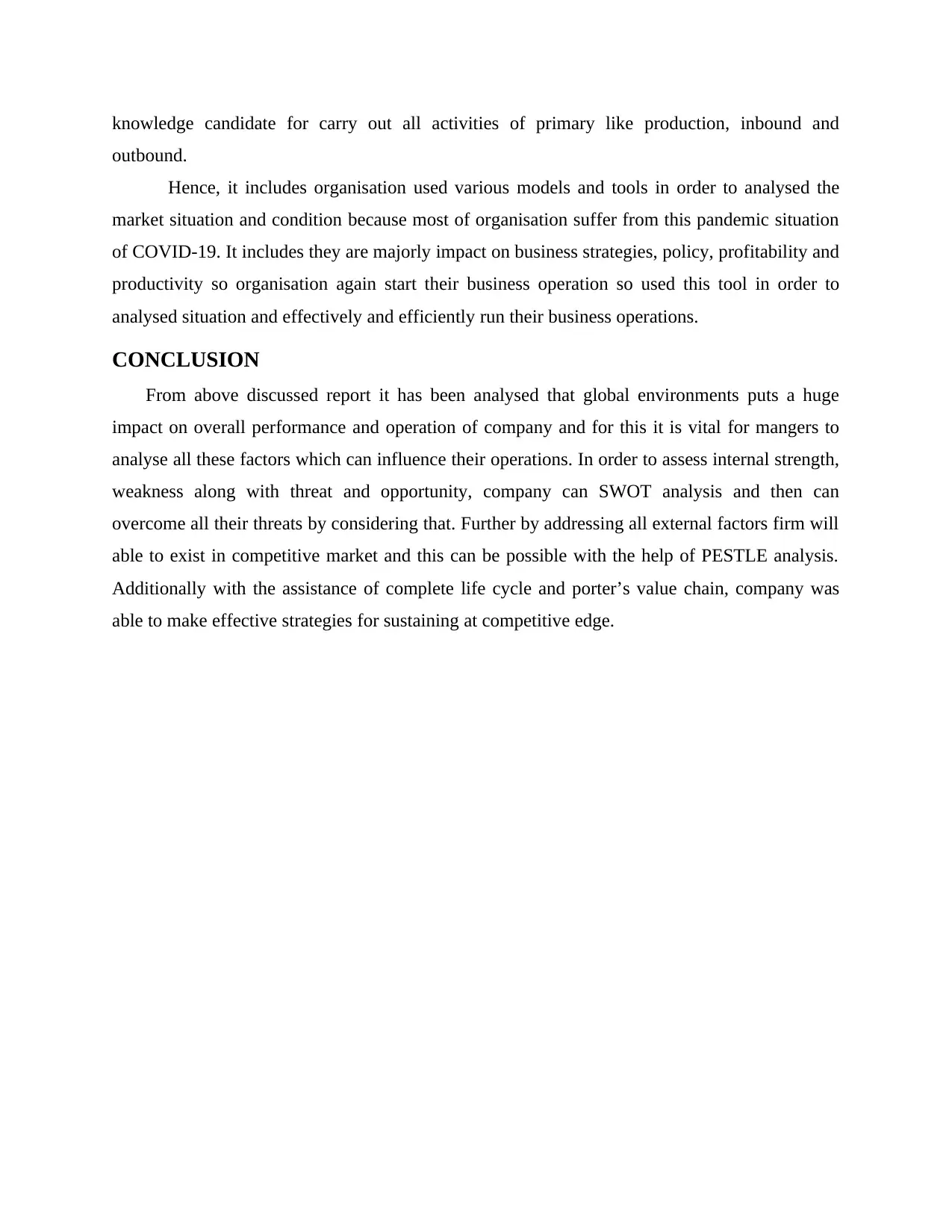
knowledge candidate for carry out all activities of primary like production, inbound and
outbound.
Hence, it includes organisation used various models and tools in order to analysed the
market situation and condition because most of organisation suffer from this pandemic situation
of COVID-19. It includes they are majorly impact on business strategies, policy, profitability and
productivity so organisation again start their business operation so used this tool in order to
analysed situation and effectively and efficiently run their business operations.
CONCLUSION
From above discussed report it has been analysed that global environments puts a huge
impact on overall performance and operation of company and for this it is vital for mangers to
analyse all these factors which can influence their operations. In order to assess internal strength,
weakness along with threat and opportunity, company can SWOT analysis and then can
overcome all their threats by considering that. Further by addressing all external factors firm will
able to exist in competitive market and this can be possible with the help of PESTLE analysis.
Additionally with the assistance of complete life cycle and porter’s value chain, company was
able to make effective strategies for sustaining at competitive edge.
outbound.
Hence, it includes organisation used various models and tools in order to analysed the
market situation and condition because most of organisation suffer from this pandemic situation
of COVID-19. It includes they are majorly impact on business strategies, policy, profitability and
productivity so organisation again start their business operation so used this tool in order to
analysed situation and effectively and efficiently run their business operations.
CONCLUSION
From above discussed report it has been analysed that global environments puts a huge
impact on overall performance and operation of company and for this it is vital for mangers to
analyse all these factors which can influence their operations. In order to assess internal strength,
weakness along with threat and opportunity, company can SWOT analysis and then can
overcome all their threats by considering that. Further by addressing all external factors firm will
able to exist in competitive market and this can be possible with the help of PESTLE analysis.
Additionally with the assistance of complete life cycle and porter’s value chain, company was
able to make effective strategies for sustaining at competitive edge.
Paraphrase This Document
Need a fresh take? Get an instant paraphrase of this document with our AI Paraphraser
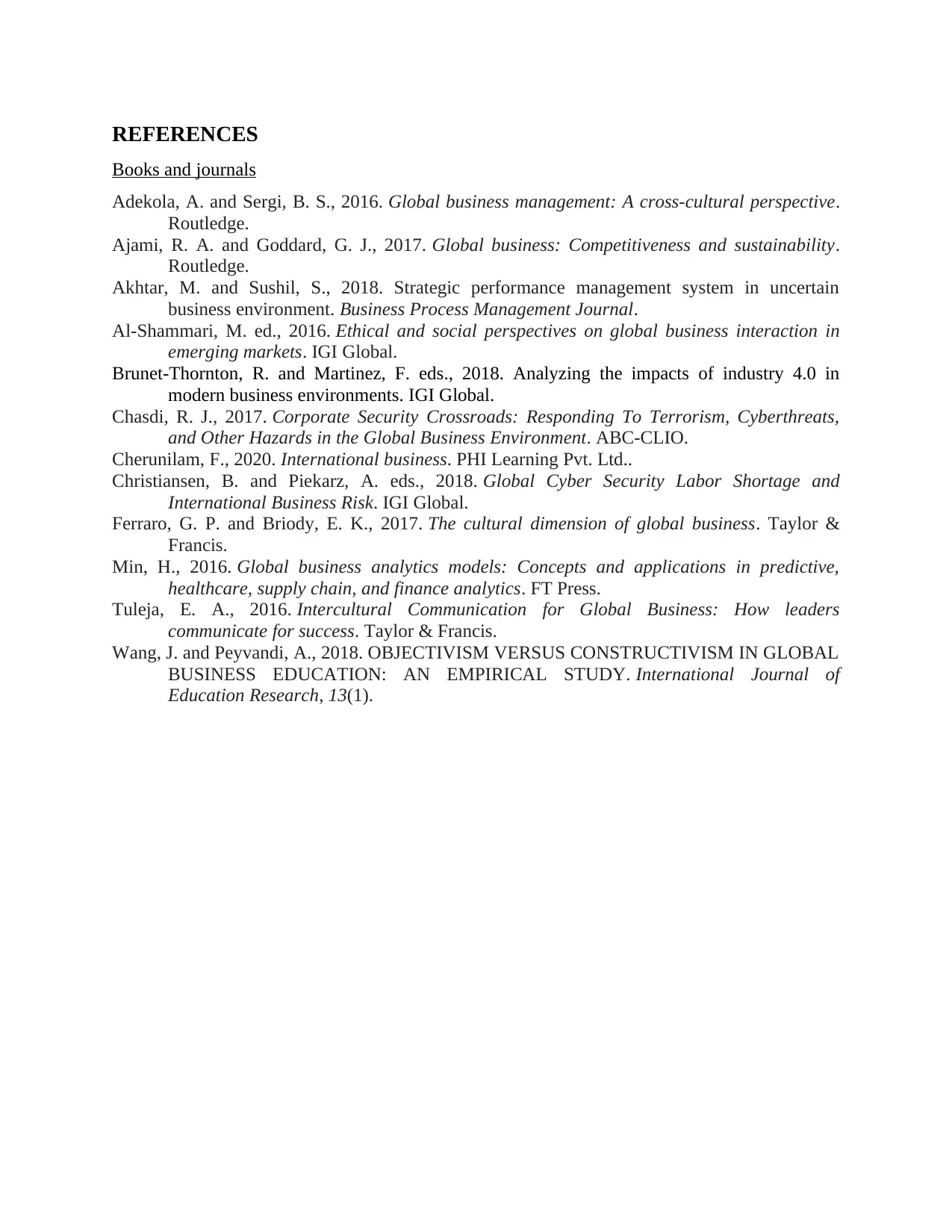
REFERENCES
Books and journals
Adekola, A. and Sergi, B. S., 2016. Global business management: A cross-cultural perspective.
Routledge.
Ajami, R. A. and Goddard, G. J., 2017. Global business: Competitiveness and sustainability.
Routledge.
Akhtar, M. and Sushil, S., 2018. Strategic performance management system in uncertain
business environment. Business Process Management Journal.
Al-Shammari, M. ed., 2016. Ethical and social perspectives on global business interaction in
emerging markets. IGI Global.
Brunet-Thornton, R. and Martinez, F. eds., 2018. Analyzing the impacts of industry 4.0 in
modern business environments. IGI Global.
Chasdi, R. J., 2017. Corporate Security Crossroads: Responding To Terrorism, Cyberthreats,
and Other Hazards in the Global Business Environment. ABC-CLIO.
Cherunilam, F., 2020. International business. PHI Learning Pvt. Ltd..
Christiansen, B. and Piekarz, A. eds., 2018. Global Cyber Security Labor Shortage and
International Business Risk. IGI Global.
Ferraro, G. P. and Briody, E. K., 2017. The cultural dimension of global business. Taylor &
Francis.
Min, H., 2016. Global business analytics models: Concepts and applications in predictive,
healthcare, supply chain, and finance analytics. FT Press.
Tuleja, E. A., 2016. Intercultural Communication for Global Business: How leaders
communicate for success. Taylor & Francis.
Wang, J. and Peyvandi, A., 2018. OBJECTIVISM VERSUS CONSTRUCTIVISM IN GLOBAL
BUSINESS EDUCATION: AN EMPIRICAL STUDY. International Journal of
Education Research, 13(1).
Books and journals
Adekola, A. and Sergi, B. S., 2016. Global business management: A cross-cultural perspective.
Routledge.
Ajami, R. A. and Goddard, G. J., 2017. Global business: Competitiveness and sustainability.
Routledge.
Akhtar, M. and Sushil, S., 2018. Strategic performance management system in uncertain
business environment. Business Process Management Journal.
Al-Shammari, M. ed., 2016. Ethical and social perspectives on global business interaction in
emerging markets. IGI Global.
Brunet-Thornton, R. and Martinez, F. eds., 2018. Analyzing the impacts of industry 4.0 in
modern business environments. IGI Global.
Chasdi, R. J., 2017. Corporate Security Crossroads: Responding To Terrorism, Cyberthreats,
and Other Hazards in the Global Business Environment. ABC-CLIO.
Cherunilam, F., 2020. International business. PHI Learning Pvt. Ltd..
Christiansen, B. and Piekarz, A. eds., 2018. Global Cyber Security Labor Shortage and
International Business Risk. IGI Global.
Ferraro, G. P. and Briody, E. K., 2017. The cultural dimension of global business. Taylor &
Francis.
Min, H., 2016. Global business analytics models: Concepts and applications in predictive,
healthcare, supply chain, and finance analytics. FT Press.
Tuleja, E. A., 2016. Intercultural Communication for Global Business: How leaders
communicate for success. Taylor & Francis.
Wang, J. and Peyvandi, A., 2018. OBJECTIVISM VERSUS CONSTRUCTIVISM IN GLOBAL
BUSINESS EDUCATION: AN EMPIRICAL STUDY. International Journal of
Education Research, 13(1).
1 out of 11
Related Documents
Your All-in-One AI-Powered Toolkit for Academic Success.
+13062052269
info@desklib.com
Available 24*7 on WhatsApp / Email
![[object Object]](/_next/static/media/star-bottom.7253800d.svg)
Unlock your academic potential
Copyright © 2020–2026 A2Z Services. All Rights Reserved. Developed and managed by ZUCOL.



